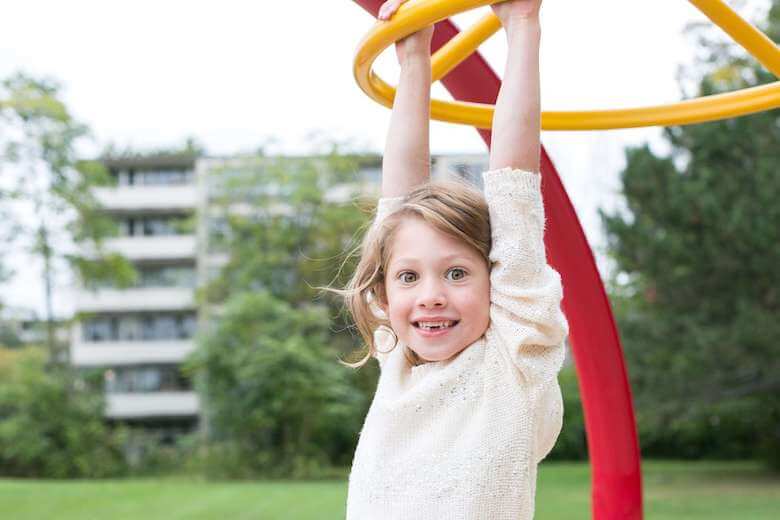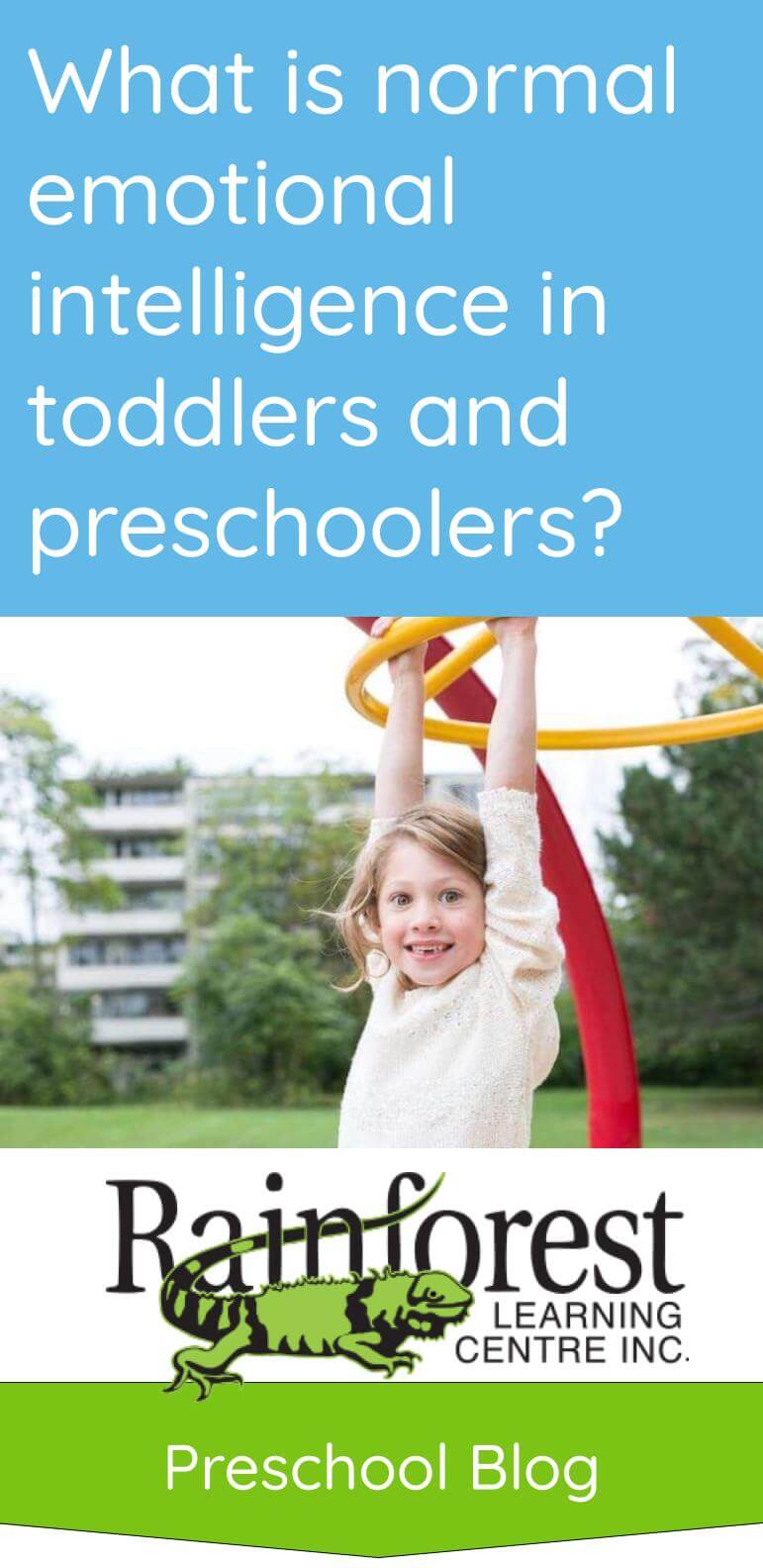
Emotional intelligence is becoming a buzzword in the media, especially as it relates to job skills. However, this skill is important for more than just jobs; it affects all our human relationships. While the word “emotional” may, in some people, signal a sense of ‘weakness,’ we are learning that it is not that. We are not talking about unreasonable emotions when we talk about “emotional intelligence.” Quite the opposite: we are talking about how to develop proper emotional reactions to certain situations in life.
So when it comes to toddlers and preschoolers (who, we all know, are very reasonable – ha!), what would we describe as emotional intelligence? What is age-appropriate social, emotional and mental behaviour in the early years? Should we panic if our four-year-old still has temper tantrums in public? What about making friends – should that be scary? The answers can be specific to your situation. We’ll explain more below.
Emotional intelligence needs to be developed with help from caregivers
The first thing to know about emotional intelligence in toddlers and preschoolers is that it doesn’t always come naturally. Yes, children pick up a lot on their own. But they also learn a lot by example. So, you can assume you are being ‘watched’! Everything you do in this regard can affect the emotional IQ of a child.
But, you’re not the only person in your child’s world. They may also pick up social cues and learn behaviours from those at daycare or preschool, or other caregivers.
However, in this ‘mix’ of learning how to behave and ‘be,’ emotionally speaking, we should assume that it is very helpful to learn explicit tips for managing emotions.
Even as adults, we sometimes still have to learn how to receive constructive criticism, without blowing up, or blowing things out of proportion. Imagine how hard this can be for children, without life experience.
As caregivers, we would say it is our job to help guide children through the ups-and-downs, and turnabouts of emotional intelligence. This can be by regulating behaviours with age-appropriate discipline (not punishment!). Or, by teaching them emotional literacy. Or even, by seeking an occupational therapist or play therapist, if you feel your child needs professional help.
These are not the only ways to guide a child through emotional intelligence, but they are examples.
Emotional intelligence in preschoolers can change by age, culture and individuality
While we know you may be ‘itching’ to find out, ‘what is normal emotional intelligence in toddlers and preschoolers’ the reality is, ‘normal’ is a relative word. As this article explains, sometimes the ‘norm’ is different based on culture, age and the individual characteristics of a child.
So, like in the same manner we don’t get too worried if our baby doesn’t crawl until age one, or that our toddler may not know their A-B-C’s as soon as their cousin who is younger than them, we also don’t need to worry too much if a child hasn’t reached emotional developmental milestones.
And remember, these are things that can be nuanced, and hard to pick up. Even we as adults may not find our own feelings obvious to put names to. So, learning emotional intelligence skills ‘naturally’ is not as easy as it sounds. Sometimes, we pick up emotional habits we don’t want this way, just as much as we can pick up emotional habits we do want, when simply copying others by example.
So remember, regardless of age, this is something that will probably need to be taught to your child. The rate at which they learn emotional skills can also be ‘fluid.’
Emotional development milestones for preschoolers can include:
With the above said, we can give you some general pointers on emotional intelligence skills that can be considered ‘milestones’ for preschoolers and toddlers.
A very well-articulated article on the features of emotional intelligence can be read here. Now, this article is about emotional intelligence in the large sense, and in that case, is written more for leaders of organizations. However, it can really help us understand what characterizes so-called, ‘good’ emotional intelligence behaviours. These are the ultimate goals for when our children reach adulthood.
But, to ‘dumb that down’ a little bit, for our cute little toddlers and preschoolers, we can give examples of ‘normal’ emotional development as:
- Being able to play in pairs or in group settings.
- Being able to follow social group rules, such as sitting (relatively) still during circle time.
- Being able to loosely follow rules in games (e.g. they can play hide-and-seek but they don’t yet understand that ‘hiding’ means not knowing where the other person is – but still they follow the counting and ‘seeking’ steps, and act excited when they ‘find’ you).
- Being able to say what they want (even if it is for hunger, a toy, or wanting to go to the bathroom) without crying about it.
- Being able to say what they don’t like or don’t want (e.g. I don’t like fish!) again, without crying about it or making a fuss.
- Understanding that sometimes, ‘no’ means ‘no’ (assuming you are using a balanced parenting style).
- Listening and at least trying to understand you when you explain that, while they are not in trouble, their emotional outburst is not ok in the future, or that there are other ways of handling a situation. For example, you may teach them about breathing exercises, or stopping and asking for help first, etc.
- Spending more time to overcome difficult tasks, which can show more focus and resilience when things get frustrating (e.g. trying to stack blocks, build train sets, take off buttoned shirts, looking for their lost toys and generally figuring things out).
- Being able to answer the questions, “are you sad?”, “are you happy?” or “are you mad?” (even if they get it wrong, or are actually confused about their feelings, they should be able to at least understand that these are options, and help lead you to what the problem is).
- Being able to use their imagination to play.
- Being able to take turns, or ask for a turn.
- Showing more independence such as dressing themselves, going to the bathroom on their own, eating with utensils and generally not minding if an adult is not there to help with everything.
- Forming empathy towards the feelings of others (e.g. if a child is crying they may ask, “why is she crying?” out of concern, or they may want to bring a toy to a sad child, etc.).
- Wanting to make others satisfied or happy (e.g. following along with another child’s game idea, wanting to give you a present, etc.).
Emotional intelligence in children is not normal when:
While we’ve given examples of generally accepted ‘norms’ when it comes to preschool emotional intelligence, there are some cases where you may be rightly concerned. These can include:
- A total unwillingness to participate in any social activity with peers.
- Extreme attachment to caregivers.
- Unwillingness to share, or take turns, ever.
- Unexplained outbursts of anger or fear that are not logical, even for a preschooler’s expected ‘logic.’
- Not being able, or not wanting to do anything independent, such as using utensils when eating, putting on shoes, using the toilet, and so on.
- Not being adaptable to changes in routine or schedule, or anything that seems ‘out of the ordinary.’
As you’ll notice, some of the above behaviours may be ok to ‘wait out’ for babies or toddlers. But by the time a child is 4 or 5, they should be able to progress from these standards. Again, however, this can be dependent on your family’s situation. For example, if a new sibling arrives on the scene, your older child may be acting this way to get attention (who knows!). If the child has landed in a new country and doesn’t yet speak the local language, it would also be expected that they’d have trouble making friends, and may feel more attached to parents.
But, if the issue persists, it may be wise to ask a family doctor or specialist, just in case. You know what they say: it’s better to be safe than sorry.
To conclude: emotional intelligence in preschoolers and toddlers is not ‘cut and dry’ but it is important
All-in-all, we can summarize the advice above by saying that an evaluation of ‘normal’ emotional intelligence for preschoolers and toddlers won’t be the same for everyone. It can fluctuate between individuals and circumstances. That said, it should definitely not be ignored. Emotional intelligence affects social skills, which children will need long before they become professionals in adult occupations. Their friendships at school, their ability to not have irrational fears, their independence and their general happiness can all depend on it. While you shouldn’t be worried if your child is a little bit behind with their emotional IQ, you should seek professional help as soon as possible, if you suspect there is a real problem waiting to be found out.
See related on our blog:
- 3 ways to build self-awareness in early childhood
- Does my child need a speech therapist? Here is what to know
- How to know if your child is emotionally ready for school
- What is social competence in the early years?
- 3 ways to build confidence in young children
- 3 Key tips to understand and solve temper tantrums in toddlers and young children
- 3 ways early childhood educators can help kids get along and feel included
- The importance of eye contact in young children, and how to teach it as a social skill
- Why are ‘home values’ important for child development and in early childhood education?
